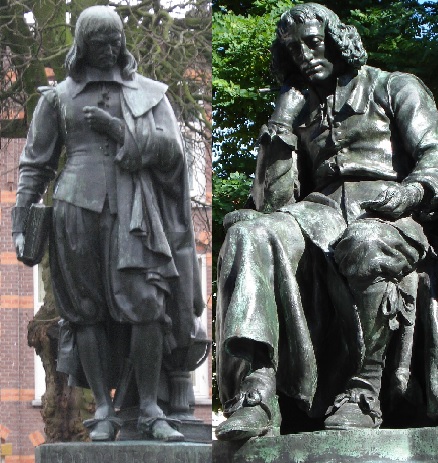Descartes en Spinoza hadden verschillende ideeën over libertas philosophandi
Op de pagina van de The University of Melbourne, waarop de lezing die dr Gerhard Wiesenfeldt aldaar heeft gegeven op 11 augustus om 18:30 uur (Australische tijd, daar is het nu al 12 aug ca 01:15 uur) over "Contesting Academic Freedom: Descartes, Spinoza, and the Limits of Toleration," herinnert hij ons er aan dat in Den Haag zowel een standbeeld staat van Descartes als van Spinoza (hoewel de laatste zit, noemen we het toch een standbeeld).

The principle of libertas philosophandi (or freedom of philosophising) was widely debated in seventeenth century Europe. Should philosophers and other academics be allowed to write and teach without any boundaries given by religion and politics or should only those philosophies be allowed that were deemed acceptable by the ruling authorities? And if philosophical freedom was granted, who should have the right to exercise it, only members of universities or everybody? Many of the answers that were given to these questions led to the modern concepts of academic freedom and freedom of speech.
The philosophies of René Descartes (1596-1650) and Baruch de Spinoza (1632-1677) became deeply embroiled in these debates. Not only were many of their respective positions among those that were frequently regarded as transgressing the limits of philosophical freedom, Descartes and Spinoza engaged in the debate themselves and developed their own concepts of libertas philosophandi.
This lecture will discuss the role Descartes and Spinoza played in the debate about academic freedom in the seventeenth century. It will focus on the Dutch Republic, the state in which both philosophers lived and wrote their major works. The Dutch Republic had become known for its religious and intellectual tolerance during the seventeenth century. Yet, even within the young republic toleration had its limits, not the least because of earlier internal conflicts about diverging religious ideas. The lecture will argue that in the course of the debates the ideas of Descartes and Spinoza on philosophical freedom were regarded as distinct concepts proposing different interpretations of libertas philosophandi.
Dr Gerhard Wiesenfeldt is a lecturer in the History and Philosophy of Science Programme at the University of Melbourne. He has studied physics, philosophy and history of science. He holds an MSc in physics and a PhD in history of science, both from the University of Hamburg. Prior to coming to Melbourne in 2007, he has been a lecturer at the Friedrich Schiller University Jena (Germany). He also has held a Research Fellowship at the Max-Planck-Institute for the History of Science in Berlin and a Scaliger Fellowship at the University of Leiden (Netherlands). He has published extensively on the history of early modern science and philosophy in Germany and the Dutch Republic, as well as on the history of early modern universities. [Cf.]
Wiesenfeldt, G.B., Leerer Raum in Minervas Haus. Experimentelle Naturlehre an der Universität Leiden, I675-1715 (diss. Hamburg 1999). [PDF KNAW]
Cf. de reeks History of Science and Scholarship in the Netherlands van de KNAW.


Reacties
En dan moet deze doorgeleerde heer, die eerder L. Meyer verkeerd neerzette, nu Van den Enden's pleidooi voor publiek 'Vry redens gebruick' in VPS (1665) maar weer vergeten te vermelden!
Wim Klever 14-08-2015 @ 21:40